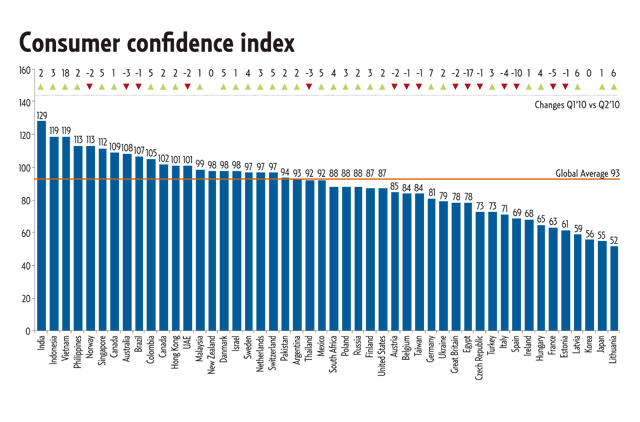
Dubai: Even the US recorded an upturn in consumer sentiments, albeit by two percentage points.
But there was not much joy among their counterparts in Europe as nine out of the 24 European markets surveyed in Nielsen's Global Consumer Confidence Index expressed an erosion in consumer confidence levels during the second quarter of the year.
Not surprisingly, the sharpest drop in consumer confidence was recorded in Spain where there is a growing debt burden and consequent disquiet among its populace. This was apparent in the Nielsen findings which had Spain at 69 index points, down from 79 in the first three months of 2010. Expectations of any sort of good news from Spain in the near term is remote.
"With the highest unemployment in Europe [20 per cent] and a reduction of government employees, Nielsen experts estimate the possibility of economic growth will move further out to 2012," said the report. The Consumer Confidence Index levels above and below a baseline of 100 indicate degrees of optimism and pessimism.
But Germany, Europe's largest economy, reported far better tidings. Consumer confidence was up seven index points to 81 in the second quarter as "newly confident Germans began to open their wallets again and were among the world's top 10 discretionary spenders on clothes and out-of-home entertainment," the report finds.
"In fact, the German job market showed a rather robust upward trend and possible sign that consumers now believe that the worst has passed."
The global average in the Nielsen findings could have been a lot worse if it were not for a marked upturn in sentiments among consumers in Asia, with those in India (on 129 index points), Indonesia and Vietnam (at 119 index points) being the most optimistic.
However, Japanese consumers played spoilsport with an index point of 55, just ahead of Lithuania's 52 points.
"Despite bright prospects in Asia, the global economic recovery that was anticipated this year has been hindered by Europe's ongoing debt crisis," said Himanshu Vashishtha, regional managing director for the Middle East and Pakistan, The Nielsen Company.
The UAE found itself among the Top 10 nations with the most confident consumers. "With the steep decline of early 2009 well behind them, consumers continue to be comfortable about their financial situation and job perspective this quarter, largely convinced that the worst is over," added Vashishtha.
Globally, concerns about the economy and job security remain consumers' top concerns in the second quarter.
The Nielsen Global Consumer Confidence Survey was held between May 10 and May 26, and polled approximately 27,000 consumers in 48 countries about their confidence levels and economic outlook.
The index is developed based on consumers' confidence in the job market, status of their personal finances and readiness to spend.
However, another recent poll suggested European consumer confidence was finally on the mend and, in fact, touched a 26-month high in July. Reuters reported that the turnaround was felt as the belief gained ground the Eurozone was shaking off the debt crisis.
Consumer morale was another in a string of indicators which showed the currency area continued to recover from the worst economic crisis in decades, despite turbulence on its sovereign debt market and uncertainty about the health of banks, Reuters reported.
"The pick-up in Eurozone consumer confidence in July, following on from the improved purchasing managers' surveys for both manufacturing and services, suggests that Eurozone GDP growth may hold up better than had been previously expected in the third quarter," Reuters quoted Howard Archer, chief European analyst at IHS Global Insight.
Spending cuts
But spending cuts planned by many Eurozone governments to prevent the Greek debt crisis from spreading to other countries were likely to hit consumer morale, which will curb private demand and curtail economic growth, analysts quoted by Reuters said.
"The suspicion remains that Eurozone consumers are going to remain pretty circumspect in their spending," said Archer. "Eurozone consumer confidence is still relatively subdued, the Eurozone unemployment rate is currently at a near 12-year high of 10 per cent, wage growth is muted, and fiscal policy is being tightened appreciably in many countries. This is hardly an ideal cocktail for robust consumer spending."
Consumer morale is key for bolstering the Eurozone's recovery, which has so far been fuelled mainly by exports. The European Commission forecast last month that the currency area's economy will expand by 0.9 per cent this year, after shrinking 4.1 per cent in 2009.
Despite labour market improvement in some countries, unemployment was expected to remain high — it was near the Eurozone's 12-year peak at 10 per cent in May — restraining people's spending power.












